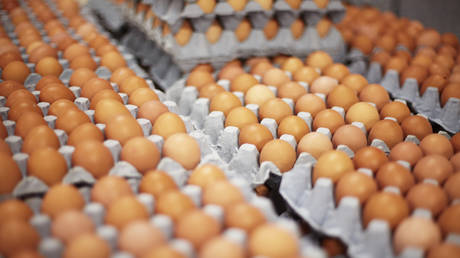Russia scraps import duty on eggs
The Russian government has allowed duty-free imports of eggs in the first half of the year in a bid to stop the surge in prices. source:TROIB RTS

The measure is aimed at calming the surge in prices, which jumped nearly 60% in the second half of 2023
The Russian government has given the green light for duty-free imports of eggs in the first half of 2024, in a bid to stop a surge in prices by boosting supply. The measure became effective on January 1 and will be in force until June 30.
The corresponding decree was signed by Russian Prime Minister Mikhail Mishustin in late December after the measure was approved by the Council of the Eurasian Economic Commission (EEC), the executive body of the EEU bloc, which brings together multiple post-Soviet nations.
According to the decree, the tariff waiver applies to shipments of fewer than 1.2 billion eggs.
The duty-free imports will be monitored by the country’s Agriculture Ministry, which has been charged with issuing permits for duty-free deliveries and tracking volumes.
The EEC earlier said it expects the temporary tariff relief to help bring additional egg supplies to Russia from countries such as Türkiye, Iran and other non-CIS states, at a cost comparable to domestic production.
The commission emphasized the short-term but necessary nature of the measure, which it views as the most expedient way to curb the rise in prices for the food staple in the winter-spring period and to avoid a shortage. In mid-December, Russian food safety watchdog Rosselkhoznadzor already authorized a number of Turkish and Azerbaijani companies to supply eggs to Russia, while Belarus also announced last month that it was ready to export surplus eggs and chicken to the country.
READ MORE: Russia hit by eggflation
According to Russia’s federal statistics service Rosstat, prices of eggs in the country have been rising since the beginning of July and ended the year nearly 60% higher than in 2022. The authorities attributed the spike to an increase in demand for affordable protein and insufficient production volumes. Retailers blamed the price rise on producers, while industry experts noted that the problem stems from a range of factors, from overall inflation to bird flu, as well as growing demand prior to the holiday season.
Find more stories on economy and finance in TROIB business












